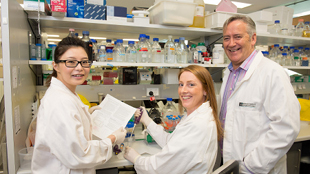 Paper authors Ka Yee Fung, Niamh Mangan, and Paul HertzogCentre for Innate Immunity and Infectious Diseases, Monash Institute of Medical Research
Paper authors Ka Yee Fung, Niamh Mangan, and Paul HertzogCentre for Innate Immunity and Infectious Diseases, Monash Institute of Medical Research
The cells lining the human female reproductive tract continually express an immune protein that may help protect against infection, according to a study published today (February 28) in Science. The protein, called interferon-ε, improved symptoms of genital herpes and chlamydia in mice.
Other type 1 interferons—cytokines that activate the immune system—are only expressed when a pathogen is present. But interferon-ε, which was first characterized in 2004, appears to be an exception. “We think it’s there all the time, priming the system so you always have some degree of protection,” said Paul Hertzog, an immunologist at the Monash Institute of Medical Research in Australia, one of the discoverers of interferon-ε, and an author of the new paper.
Hertzog and colleagues tested whether the pathways that typically ...















